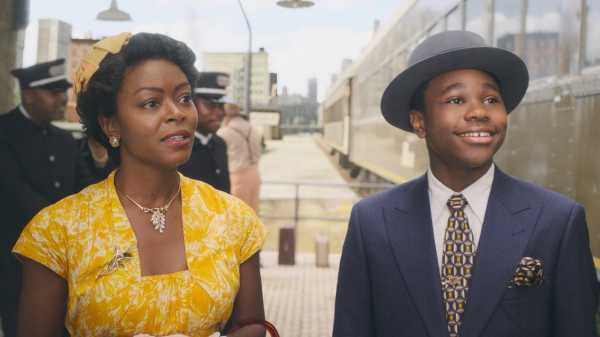
In “Till,” the director Chinonye Chukwu dramatizes the life and death of Emmett Till, a Black fourteen-year-old from Chicago, who was lynched in a small Mississippi town, in 1955. The movie reveals the story’s many hidden, deep-rooted, and wide-ranging dimensions beneath the specifics of family tragedy and local crime. It shows how the scope of the crime expanded to the center of national news and politics, sparking outrage and galvanizing the civil-rights movement—namely, through the courageous determination of Emmett’s mother, Mamie Bradley (Danielle Deadwyler). The movie (written by Chukwu, Michael Reilly, and Keith Beauchamp) looks in exacting detail at the specific and surprising nature of that commitment, and how she brought her personal experience into history in the present tense. What’s more, Chukwu develops a specific aesthetic, of analytical ardor, to embody the story in images—because the movie’s story is, essentially, one of images, of sight.
Emmett (Jalyn Hall) is a lively, good-humored teen with a sense of flair and style—a good dancer, an eye for clothes—and a warm smile. He’s looking forward to his trip to Mississippi, where he’ll stay with his aunt and uncle and visit with his cousins. But Mamie is apprehensive, because she knows well that white people there expect and demand Black people to be deferential and submissive, on pain of death, and she urges Emmett to conform to the behavior of his relatives; he agrees, but Mamie is desperately worried nonetheless. Emmett heads down South by train with his uncle Mose (John Douglas Thompson), called Preacher, and discovers the nature of Jim Crow en route when the train approaches the Mason-Dixon Line and all Black passengers are required to head to the rear of the train.
The movie depicts Emmett’s fateful interaction with a white shopkeeper, Carolyn Bryant (Haley Bennett), in all its innocent triviality, and the immediate recognition by Emmett’s cousins and other local Black people that it’s likely the cause of terrible trouble. Emmett is seized at gunpoint by white men who break into Preacher’s house. The murder of Emmett isn’t shown, just suggested, from a great distance, outside the house where it happened, with brief and vague sounds of violence and horrific screams. Mamie is informed that Emmett has been kidnapped, and his disappearance quickly moves into the political sphere: her parents, John Carthan (Frankie Faison) and Alma Carthan (Whoopi Goldberg), who were divorced, introduce her to a cousin, Rayfield Mooty (Kevin Carroll), who works with the N.A.A.C.P. and affirms that the organization will contact high officials, including the mayor of Chicago and the governor of Illinois, to help Emmett. His kidnapping becomes news; politicians take an interest in finding Emmett. Then Mamie is told of Emmett’s death, of his body being identified by his ring (that belonged to his late father), and of Mississippi’s plan to bury Emmett there.
That official scheme, to get Emmett’s body quickly and permanently out of sight, provides the movie with its fulcrum, and it’s Mamie who discovers the power of leverage that results. The film’s great shift occurs in her meeting, on a porch, with Rayfield, in which she utters one of the movie’s key lines: “I need to see him.” (Chukwu films the meeting in a poised wide shot that lends it the grandeur of a history painting.) She demands that Emmett’s body be brought back to Chicago. Rayfield protests, wanting her to put her personal emotion aside in order to bring pressure, instead, for a federal anti-lynching bill. But Mamie vehemently insists that the N.A.A.C.P. first bring Emmett home.
To Rayfield and other organizers, Mamie’s intransigence seems shortsighted, even unduly personal. But her position is guided by an unerring sensibility and principle—an immediate and primordial fidelity to personal experience, to the bonds of love—that prove to be overarchingly political, and the very basis of solidarity and collective action. Emmett’s body is placed on a slab in a Chicago mortuary, where Mamie, her fiancé, Gene Mobley (Sean Patrick Thomas), and the coroner observe it. Only when Mamie orders the two men out of the room, so that she can have private time with her son, does “Till” show the horrific mutilation of Emmett’s body, suggesting the monstrous violence to which he was subjected. (Chukwu makes the point conspicuous, even emphatic, by interposing a table between the camera and the body until the men leave.) The movie shows the body from Mamie’s perspective, not just visually but, above all, emotionally, because that proves to be exactly how, and why, the world at large came to see Emmett’s body, too.
Mamie insists that Emmett’s funeral be open-casket, and that his body be unadorned by the mortician’s cosmetics. Her reasons are as literal as they are emotional: his condition is so appalling that people won’t believe it unless they see it, and she knows that the emotional power of the sheer fact of his mutilation will prove to be of crucial political power. Outside the church where the funeral is being held, she gives a brief, remarkable speech to the press and assembled mourners: “That smell is my son’s body, reeking of racial hatred. Now I want America to bear witness.” She invites a Black news photographer (Noel Sampson) into the church, where he creates images, published in Jet magazine, that quickly became historic.
In response to the outcry over Emmett’s killing, two white men were indicted for his murder, and “Till” dramatizes in great detail the proceedings in the kangaroo court, composed entirely of white male officials and jurors, that acquitted them. Here, too, the movie follows the events from Mamie’s perspective. Defying death threats, she heads to rural Mississippi to testify at the trial, because the killers’ attorney makes the cruel defense that the body, mutilated unrecognizably, was in fact not Emmett’s—even that the lynching was a hoax, meant to advance the cause of the N.A.A.C.P., and that Emmett was still alive but hidden away.
Chukwu presents an analytical panorama of Jim Crow, of the legal system that perpetuates racist policies overtly and covertly, and of the social system that extends beyond it; these systems operate by means of explicit and implicit threats of violence that come from white people who do so in the confidence that the law will stand behind them. (There’s another majestic cinematic history-painting, of Mamie and Preacher, in which he details Black Mississippians’ endurance of official and unofficial racism that is, as he puts it metaphorically, a matter of the very air they breathe.) The movie shows, movingly, the daring and dangerous organization required of Black people to insist on their rights (including the elaborate evasive measures that Mamie needed to take en route to the trial). The presence of Medgar Evers (Tosin Cole) among Mamie’s associates and supporters is a shocking reminder of the violence that civil-rights activists faced. There’s a suggestion of the essentially gendered, sexualized nature of racist violence in the apparent naïveté of a sign near the town of Sumner, where the trial was held: “A great place to raise a boy.” And there’s a crucial reminder of the essential connection between endemic gun ownership and the enforcement of white supremacy.
But, above all, “Till” is a work of mighty cinematic portraiture, with a range of closeups of Mamie that infuse the film with an overwhelming combination of subjective depth and an outward sense of purpose. These images depend for that vast spectrum of feeling upon Deadwyler’s performance, one of the most radiantly, resonantly expressive to grace the screen this year. As the star of a film about the power and principle of vision, Deadwyler says more in a glance than other actors might in a soliloquy, and her discourse—as in Mamie’s calmly outraged testimony at trial, done in a single extended take—conveys the authoritative strength of prophecy. What’s more, her performance, for all its concentrated energy, extends to the realm of the vitally physical in a moment of ecstatic silence, after she addresses a crowd in Harlem on behalf of the N.A.A.C.P., when her upper lip trembles. Mamie, having had her life transformed against her will, having been forced to take on a public role that she’d never have wanted, has come to recognize that the life of a Black person in the United States is essentially and inescapably political, and demands her ongoing and unrelenting action. ♦
Sourse: newyorker.com






